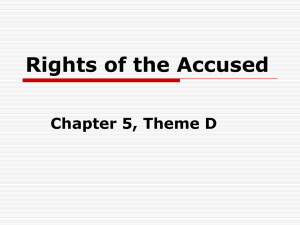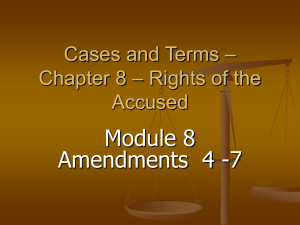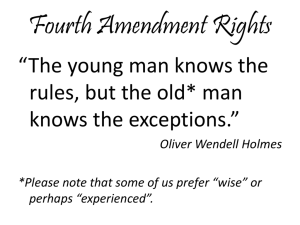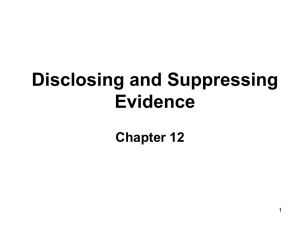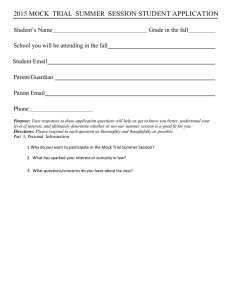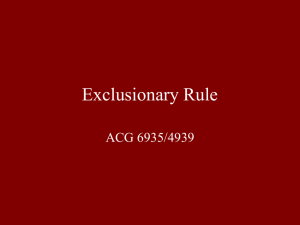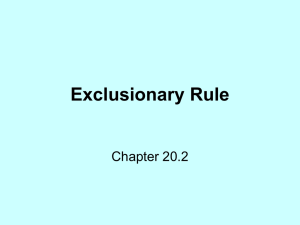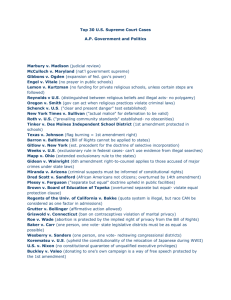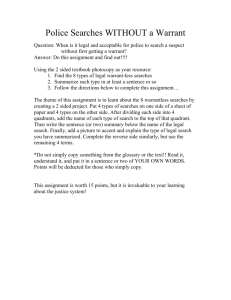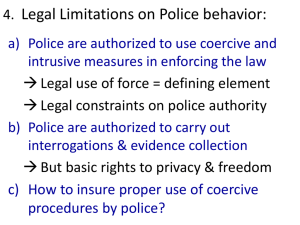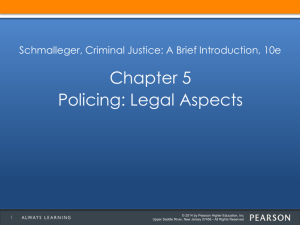Due Process & Judicial Rights
advertisement
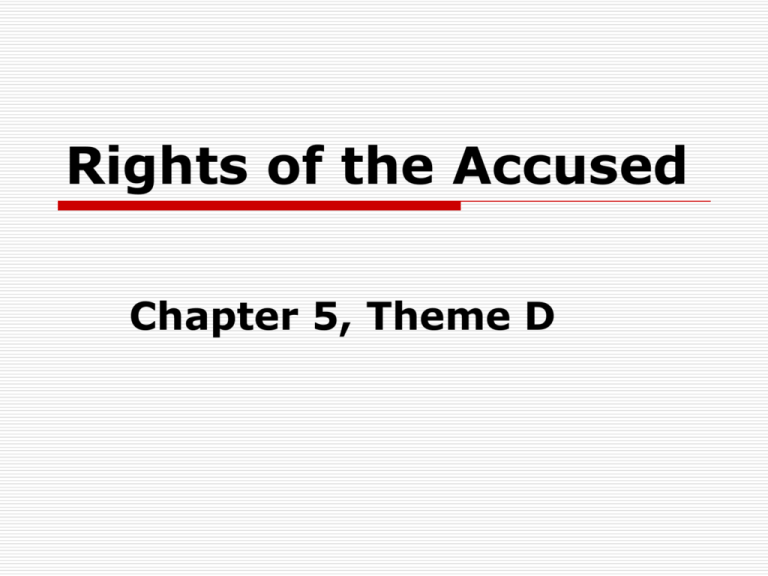
Rights of the Accused Chapter 5, Theme D FRQ Pop Quiz Log on to room 917563 and take Socrative quiz. Shut computer or put away your electronic device when done. Why is the 14th Amendment a “Good Answer?” The Due process clause of the 14th Amendment guarantees that judicial rights cannot be taken away by ANY level government Most basic judicial rights are found in the 4th, 5th, 6th & 8th Amendments. Incorporation Until the Warren Court of the 1960s, most rights of accused found in BOR only applied to the federal government. Warren court used Judicial Activism Not all rights of the accused found in the BOR have been incorporated to the states. Selective incorporation Grand Juries and bail practices have not yet been incorporated. 4th Amendment “The right of the people to be secure in their persons, houses, papers, and effects, against unreasonable searches and seizures, shall not be violated, and no Warrants shall issue, but upon probable cause, supported by Oath or affirmation, and particularly describing the place to be searched, and the persons or things to be seized.” Legal questions are not in the meaning, but what to do when the procedures above are not followed and rights are violated. Explaining police searches When can police search your home? Obtain a warrant by swearing probable cause under oath to judge or magistrate. Consent, plain view, public safety, hot pursuit, airports What can police search with warrant? Detailed on warrant with what they are searching for and where they may search. Can search anywhere in home where contraband may be hidden. Searches & the Exclusionary Rule When 4th Amendment rights are violated, what should happen? Punish police that violate the rules Exclude the items illegal searched and seized (Exclusionary Rule) The Exclusionary Rule was created in 1914 by the ruling in Weeks v. US. The practice was incorporated to states using the due process clause by the case Mapp v. Ohio (1961). Read case & discuss. Car searches The Supreme Court has whittled away at exclusionary rule when applying the standard to vehicles. Why? Transportable, Less expectation of privacy What & who can police search in car? Anyone in car, any place under your control, any place if reasonable suspicion of illegal activity. School Searches Which are constitutional? Student lockers Student possessions with reasonable suspicion (NJ v. TLO) Drug testing (Vernonia v. Acton) Strip searches only under extreme circumstances (Safford v. Redding) 5th Amendment “No person shall be held to answer for a capital, or otherwise infamous crime, unless on a presentment or indictment of a Grand Jury, except in cases arising in the land or naval forces, or in the Militia, when in actual service in time of War or public danger; nor shall any person be subject for the same offense to be twice put in jeopardy of life or limb; nor shall be compelled in any criminal case to be a witness against himself, nor be deprived of life, liberty, or property, without due process of law; nor shall private property be taken for public use, without just compensation.” Explaining the 5th’s Rights Grand Jury purpose? Not incorporated! What is double jeopardy? What is not? Why was the protection of no selfincrimination included? Why is it important? Due process is guaranteed by the 5th. What does that mean? Procedural Due Process…legal steps Substantive Due Process…application of law Self-incrimination & the Exclusionary Rule How does the exclusionary rule relate to interrogations? Miranda v. AZ Why was the Miranda rule created by the Supreme Court? What does Miranda Warning include? When must it be read? Why is it so controversial? New Interpretations of Miranda & Exclusionary Rule Brewer v. Williams outraged Americans. Many felt Miranda should be abolished. In 2000, US v. Dickerson upheld the practice of Miranda Warning and ruled it cannot be abolished by Congress. Good Faith Exception (US v. Leon) Public Safety Exception (NY v. Quarles) Inevitability Exception (Nix v. Williams) http://www.youtube.com/watch?v=XDKjNleEGJM Other Protections: 6th & 8th “In all criminal prosecutions, the accused shall enjoy the right to a speedy and public trial, by an impartial jury of the State and district wherein the crime shall have been committed, which district shall have been previously ascertained by law, and to be informed of the nature and cause of the accusation; to be confronted with the witnesses against him; to have compulsory process for obtaining witnesses in his favor, and to have the Assistance of Counsel for his defense.” Other Protections: 6th Amendment States must provide honor right to an attorney even if you cannot afford one. (Gideon v. Wainwright) Speedy, public trial must be granted by states. (Klopfer v. NC) Terrorists must have access to neutral courts, but can be treated as enemy combatants. (Rasul v. Bush) Other Protections: 8th Amendment “Excessive bail shall not be required, nor excessive fines imposed, nor cruel and unusual punishments inflicted.” Debate has largely centered on capital punishment. 1972: Furman v. GA: State statutes Unconst. 1976: Gregg v. GA: Upheld statutes as Const. 2002: Atkins v. VA: Mentally handicapped excepted 2004: Roper v. Simmons: Under 18 excepted THIS WEEK”S BLOG IS RELATED! Fines & bail must be proportionate to crime (US v. Bajakajian)
